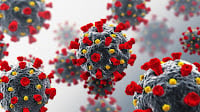COVID-19 Has Numerous Neuropsychiatric Consequences, Report Finds

An article appearing today in the Journal of Neuropsychiatry and Clinical Neurosciences provides a comprehensive overview of the neurological and psychiatric impact of the COVID-19 pandemic.
“Although best known for its severe effects on respiratory function, SARS-CoV-2 produces a broad range of acute and chronic neurological and neuropsychiatric problems,” wrote Theodora Manolis, M.D., of Red Cross Hospital in Athens, Greece, and colleagues. “The COVID-19 pandemic has also had an important impact on the mental health of many individuals in the general population as a result of loss of loved ones, fear of calamity or death, financial hardships, social isolation resulting from government-mandated quarantine and social distancing requirements, and major disruptions of daily life and social connectedness.”
Manolis and colleagues compiled data from individual case reports, cohort studies, and meta-analyses on the neurological and psychiatric outcomes in patients with SARS-CoV-2 infection. Neurological problems in hospitalized COVID-19 patients are diverse and common, the authors noted, with one analysis finding that over 80% of these patients developed one neurologic condition over the course of the illness. While muscle pain, headache, and loss of taste/smell tend to be the most common neurologic symptoms in these patients, potentially fatal symptoms including stroke and encephalopathy were also reported among hospitalized patients.
“CNS infection combined with environmental stress caused by pandemic fear, social and financial restrictions, and ICU monitoring may result in the development of neuropsychiatric symptoms or syndromes, including depressive symptoms or episodes, manic or hypomanic symptoms or episodes, psychotic symptoms, obsessive-compulsive symptoms, and posttraumatic stress,” the authors added. They described several studies and case series that seem to suggest that patients hospitalized for COVID-19 may be at higher risk of depression and/or psychosis compared with those without COVID-19.
The range of acute and long-term neurological and psychiatric problems reflects the multipronged way the virus impacts the brain, the authors noted. This includes direct penetration of the nervous system through the nasal passage or circulatory system, indirect damage from the body’s immune response, and damage related to hypoxia or delirium.
Other topics explored in the article include the following:
- Impact of COVID-19 on neurodegenerative disorders
- Adverse neuropsychiatric effects of COVID-19 treatments
- Psychiatric impact of the pandemic on health care workers
- Maladaptive coping strategies and other psychosocial impacts of the pandemic
“There is an immediate need for interventions aimed at managing the psychosocial impact and mitigate the neuropsychiatric manifestations in addition to the other health and economic consequences of this unprecedented viral pandemic,” Manolis and colleagues concluded. “Protection of mental well-being can be accomplished by providing programs structured for psychosocial support to all those in need, such as health care workers, persons stricken by unemployment and financial hardship, families with COVID-19-affected members, older adults, and other vulnerable groups.”
To read more on this topic, see the Psychiatric News articles “Expect a ‘Long Tail’ of Mental Health Effects From COVID-19” and “Psychological Stress May Not Be Only Route Of COVID-19’s Psychiatric Burden.”
(Image: iStock/BlackJack3D)






